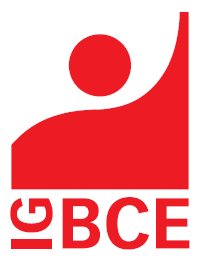Related Research Articles

Hoechst AG was a German chemicals then life-sciences company that became Aventis Deutschland after its merger with France's Rhône-Poulenc S.A. in 1999. With the new company's 2004 merger with Sanofi-Synthélabo, it became a subsidiary of the resulting Sanofi-Aventis pharmaceuticals group.
The International Federation of Chemical, Energy, Mine and General Workers' Unions (ICEM) was a global union federation of trade unions. As of November 2007, ICEM represented 467 industrial trade unions in 132 countries, claiming a membership of over 20 million workers.

The IG Bergbau, Chemie, Energie is a trade union in Germany. It is one of eight industrial affiliations of the German Confederation of Trade Unions (DGB).
Trade unions in Germany have a history reaching back to the German revolution in 1848, and still play an important role in the German economy and society.

The Factory Workers' Union of Germany was a trade union in Germany.

The Trade Unions International of Chemical, Oil and Allied Workers was a trade union international affiliated with the World Federation of Trade Unions. It was often known by its French initials, ICPS.

Gabriele "Gabi" Weber has been a member of parliament in the German Bundestag for the centre-left SPD since 2013.
The Union of Mining and Energy was a trade union in West Germany which existed from 1946 until 1997.
The Building and Construction Union was a trade union representing building workers in West Germany.
Karl Hauenschild was a German trade union leader and politician.
The Leather Union was a West German trade union representing workers in shoemaking, tanning, saddlery, and other work related to leather.
The Central Union of Glassworkers was a trade union representing people involved in manufacturing glass and glass objects in Germany.
The Union of Porcelain and Related Workers of Germany was a trade union representing workers in the ceramic industry in Germany.
The Industrial Union of Chemicals, Glass and Ceramics was a trade union representing workers in various industries in East Germany.
The Industrial Union of Construction and Wood was a trade union representing construction and wood workers in East Germany.
The Industrial Union of Printing and Paper was a trade union representing workers in the printing industry in East Germany.

The Italian Federation of Chemical and Allied Workers was a trade union representing chemical and some manufacturing workers in Italy.
The Industrial Workers' Union NVV was a general union focused on workers in heavy industry in the Netherlands.
General Union of Miscellaneous Industries was a general union in the Netherlands, focusing on manufacturing industries.
The Union of Textiles, Chemicals and Paper was a trade union representing workers in various industries in Switzerland.
References
- 1 2 3 Markovits, Andrei (1986). The Politics of the West German Trade Unions. Cambridge: Cambridge University Press. pp. 267–326. ISBN 0521305136.
- ↑ "IG Chemie, IG Chemie, Glas und Keramik (1946-90)". FDGB-Lexikon. Friedrich Ebert Stiftung. Retrieved 10 July 2020.CS1 maint: discouraged parameter (link)
- ↑ Ebbinghaus, Bernhard; Visser, Jelle (2000). Trade Unions in Western Europe Since 1945. Basingstoke: Palgrave Macmillan. p. 310. ISBN 0333771125.